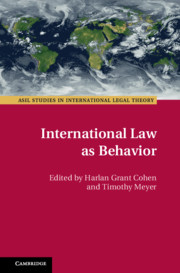Book contents
- International Law As Behavior
- ASIL Studies in International Legal Theory
- International Law As Behavior
- Copyright page
- Dedication
- Contents
- Tables
- Contributors
- Acknowledgments
- 1 International Law As Behavior
- 2 Deadlines As Behavior in Diplomacy and International Law
- 3 Cooperating without Sanctions
- 4 Egocentric Bias in Perceptions of Customary International Law
- 5 Explaining the Practical Purchase of Soft Law
- 6 Toward an Anthropology of International Law
- 7 Transnational Collaborations in Transitional Justice
- 8 Advancing Neuroscience in International Law
- 9 The Missing Persons of International Law Scholarship
- 10 The Wrong Way to Weigh Rights
- Index
10 - The Wrong Way to Weigh Rights
Published online by Cambridge University Press: 15 March 2021
- International Law As Behavior
- ASIL Studies in International Legal Theory
- International Law As Behavior
- Copyright page
- Dedication
- Contents
- Tables
- Contributors
- Acknowledgments
- 1 International Law As Behavior
- 2 Deadlines As Behavior in Diplomacy and International Law
- 3 Cooperating without Sanctions
- 4 Egocentric Bias in Perceptions of Customary International Law
- 5 Explaining the Practical Purchase of Soft Law
- 6 Toward an Anthropology of International Law
- 7 Transnational Collaborations in Transitional Justice
- 8 Advancing Neuroscience in International Law
- 9 The Missing Persons of International Law Scholarship
- 10 The Wrong Way to Weigh Rights
- Index
Summary
Quantitative scholarship about human rights tends to overclaim. Rights are subtler and more complex than these studies presume. This chapter seeks to explain why.
Keywords
- Type
- Chapter
- Information
- International Law as Behavior , pp. 265 - 284Publisher: Cambridge University PressPrint publication year: 2021

